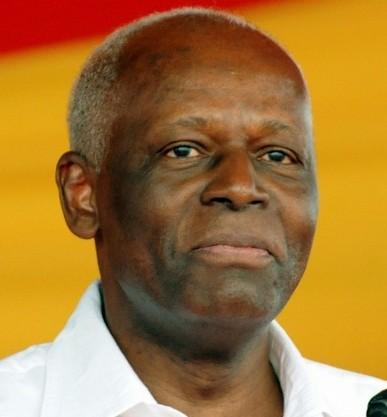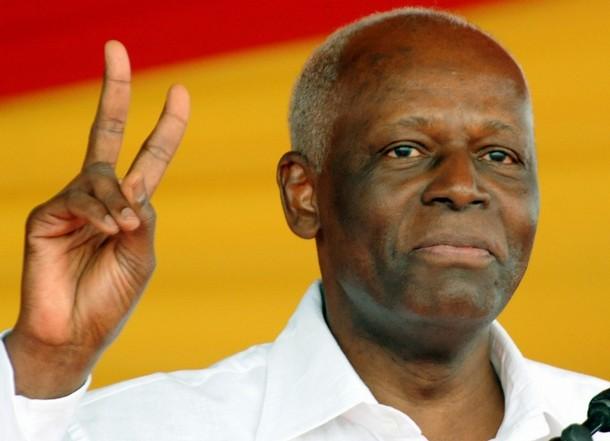Angola: Demonstrations and Presidential succession (things start to get interesting…) – by Justin Pearce

Watching Angolan politics involves holding a large magnifying glass to details that in another country would not be worthy of mention. A few hundred protesters calling for change at the top? A leader hinting that he might just step down in 2017? Party bigwigs whispering to journalists that they disagree with the leader’s preferred successor? These become significant only when you consider that President José Eduardo dos Santos has been in office since 1979, and that a few years ago the only demonstrations that were tolerated on the streets of Luanda were those that supported the government.
So when a rapper known as Brigadeiro Mata Frakus took to the stage in February with the words “Tio Zé, tira o pé, teu prazo expirou há bwé!”(Uncle Zé [Dos Santos], take a walk, your time was up long ago!,) it was hard to believe this was the Angola we thought we knew. Social networking sites were soon announcing a demonstration for 7 March in Luanda’s Largo Primeiro de Maio (1st of May Square). The organisers were swiftly arrested. But demonstrators regrouped in May, highlighting poverty and commemorating the anniversary of an unsuccessful anti-government uprising in 1977, an incident that for decades was a taboo subject in Angola. Primeiro de Maio was dubbed “our Tahrir Square”, even if the crowds of 200 or so were hardly Egyptian in size. September saw several hundred people attend more demonstrations to mark the 32nd anniversary of Dos Santos’s presidency. The arrest of demonstrators sparked more protests until those detained were released on the orders of the Supreme Court. Early in December several hundred youths were again confronted by mounted police as they tried to march into central Luanda.
Responses from the government, the ruling MPLA and the state media have been predictable: the demonstrations were trying “to return the country to civil war” or simply “criminal”, or orchestrated by foreigners who wanted to re-colonise Angola in order to exploit its riches. The MPLA bussed people to loyalist counter-demonstrations. The Luanda Provincial Government announced a ban on protests in the city centre, but this did not stop demonstrations from going ahead anyway.
No one in government or at the top of the MPLA is acknowledging that the protests are justified, or even legitimate. But there are signs that the loudest grievance on the streets, namely Dos Santos’s long tenure, has been noted. Anonymous MPLA sources have told the Angolan press that Dos Santos has floated the possibility of his resignation. That is remarkable enough. Internal MPLA elections have long been conducted by a show of hands, a practice that has discouraged, to put it gently, any independent challenge to the leadership.
What has caused consternation in the MPLA’s top ranks, however, is Dos Santos’s preference as successor: Manuel Vicente, chief executive of the state oil company, Sonangol. Vicente has no background either in the army or in active politics: this doesn’t play well among a party elite for whom memories of the anti-colonial struggle and the embattled days of the civil war still count for a lot. The MPLA’s role in relation to government has changed. In the one-party days of the 1970s and 1980s it was an instrument of political participation, albeit an authoritarian one. Since the advent of multiparty democracy, the MPLA’s role has become one of cheerleader for a political order in which decisions – particularly concerning the channelling of public money – have been taken by Dos Santos’s inner circle. MPLA old-timers cannot be blamed if they see Vicente as the embodiment of this tendency. Vicente has won praise for his businesslike management of Sonangol’s dealings with foreign investors. But Angolans are also aware of investigations that have revealed Sonangol’s role in the diversion of billions of dollars worth of oil revenue. The MPLA knows that if the protests have exposed Dos Santos as a liability to the party, then replacing him with Vicente will not make things easier. Vicente’s opponents have already floated the names of former MPLA secretary general Joí£o Lourení§o and territorial administration minister Bornito de Sousa as future president.
Dos Santos’s constitutional position has been shaky since 1992, when he missed an outright majority in the first elections, but a rapid return to civil war ruled out the completion of the electoral process. Since then, his hold over the party has allowed him to dictate the pace of change. Parliamentary elections took place only in 2008, six years after the war ended. Presidential elections were expected to follow within a year or two, but instead the MPLA used its increased majority to endorse a new constitution that does away with a directly elected president, and instead awards the presidency to the person who heads the list of candidates in the parliamentary election.
The first elections under the new constitution are expected in September 2012. No matter whom it fields as a candidate, the MPLA will continue to win elections for a generation. Protests have been in Luanda only. In the provinces, which suffered the worst of the war, the MPLA is better able to sell itself as the party of peace and reconstruction. That strategy brought the party 81% of the vote in 2008 and cut the votes for former rebel movement, UNITA, down to 10%. No other party managed more than 4%.
So any change will have to start inside the MPLA. There’s no chance of anyone other than Dos Santos heading the party list for the 2012 election, but it will be worth watching who will be in the vice-presidential spot on the list. If Dos Santos manages to push through his first choice of Manuel Vicente, expect five years of unprecedented discord at the top of the party. If it’s anyone else, it means that the party has already wriggled out of the headlock in which the president has held it for decades. After 20 years of multiparty democracy (in theory, anyway) and 10 years of peace, 2012 could finally be the year that things get interesting.
Justin Pearce – ESRC Postdoctoral Fellow, School of Oriental and African Studies







This link is very important it requires you to enhance and take seriouse action or measures to complete it. Please inform all militaries and any other people. Copy and paste URL.
http://deathattemptsinangolaforpresident.blogspot.com/2011/11/death-attempts-now-authorized-and.html